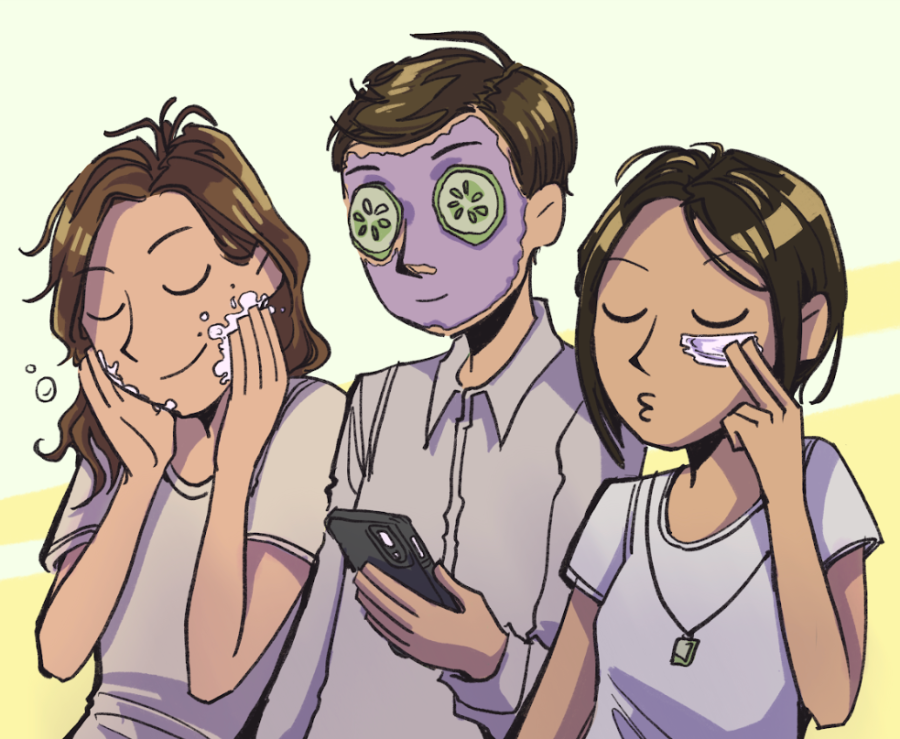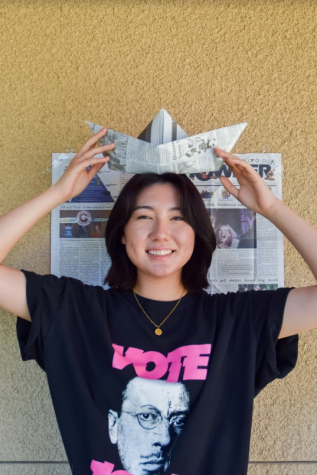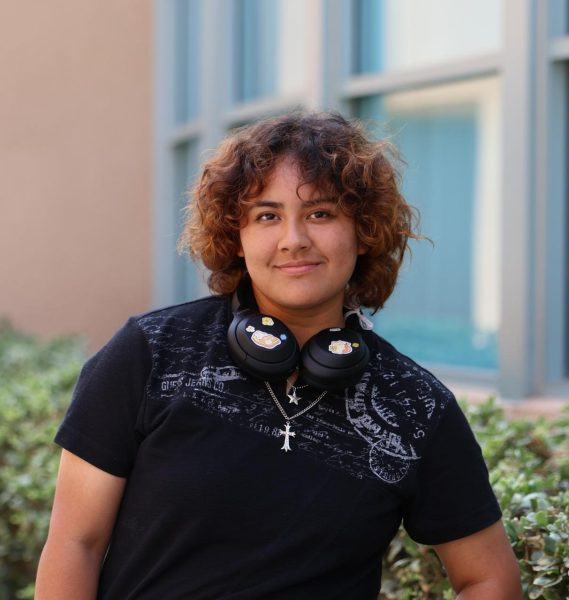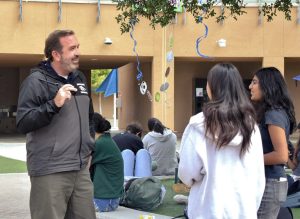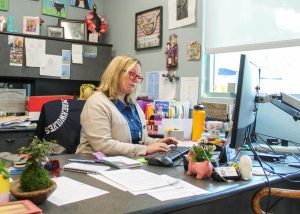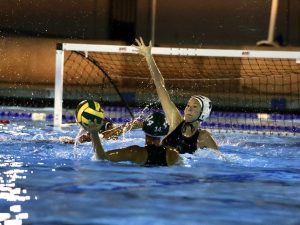Teacher Speak: How Northwood Teachers keep their Skin Fresh
GLOWING FACES: Wearing sunscreen is the number one tip that Northwood teachers, and indeed most experts, suggest. That being said, sliced cucumbers never hurt anybody.
October 7, 2022
Skincare has recently become a trend across all ages and demographics. A regiment that was once considered feminine has now spread with a positive message of cleanliness and routine. Here is some insight from Northwood teachers on their skincare routine, along with how they combat specific stereotypes over the years of skincare discovery.
The Howler: What first sparked your interest in skincare?
Anysia Leveratt: It was more like I was forced to have a skincare routine. In high school I had bad skin, as all high school students do, so my mom started getting me to go to estheticians. But after having kids, I got melasma, which is something women get after giving birth, being the discoloration of the skin, causing me to then have an expensive skincare routine.
Nathalie Nguyen: It started when I was in high school. I had terrible skin: everywhere I touched I felt texture, and skincare was a way for me to try and solve my problems and control that part of my life, which is how I started getting into it. It was a long journey for me to start liking my skincare routine, because everytime I did it, it would remind me that I had acne, and I hated that.
Zane Pang: I’m not sure if it’s an interest, but more so that I learned it was a necessity. When I was teaching at Lakeside Middle School, the health teacher there said I had really nice skin and I should make sure to use skincare products to keep it that way, to where she kind of peer-pressured me to keep my skin healthy and vibrant.
TH: Are there specific products that you use to help maintain your skincare routine, whether that would be prescription-based, or products that you found?
AL: I don’t use prescription-based, because I found that pretty much all of the stuff that actual dermatologists give you just dries out your skin and doesn’t really target the problems. I like to use a product called Eminence that’s all organic and natural-based, so there’s not a lot of chemicals, and I use all their stuff. I use their soap, toner and lotions.
NN: Sunscreen for sure. I think a lot of people, when they first start skincare, think about cleansing specifically. Especially when I had acne, I was so obsessed with having clean skin, because I thought that I had acne because my skin was dirty. But then I realized that a lot of the damage that is done to your skin is through UV rays. So if I didn’t use sunscreen, the steps before that are pretty much useless.
TH: Does your morning routine differ from your night routine?
AL: Yes, it’s entirely different. Morning: I wake up. I use soap and an exfoliating powder, which is a dried strawberry powder. I wash my face. Then I put on toner, eye cream, a vitamin C serum and then I do a cell-renewal serum for wrinkles. I then use a lotion and sunscreen which is zinc-based sunscreen because it’s better for the environment and your skin. At night, I wash my face. I do toner, retinol for the skin and discoloration. I also use hydroquinone, which is a retinol-based cream, an oil and then a nighttime lotion.
NN: For my morning routine, I cleanse once, and then do moisturizer and sunscreen. At night, sometimes I do a chemical exfoliant if I have acne or dead skin cells that build up throughout the week.
ZP: Yes. I exfoliate twice a week, and if I don’t exfoliate, I use a cleanser. In the mornings, I use a vitamin C serum, followed by eye cream. I then use my moisturizer which is also a sunscreen. My nighttime routine is the cleanser, followed by retinol and then eye cream and then moisturizer. And then sometimes, if I feel really fancy, I’ll do a face mask.
TH: There are often stereotypes with keeping up a front with nice skin and makeup for women. From your experience, how has societal pressure impacted you in terms of cleanliness and the stereotypes behind keeping certain routines?
AL: It’s totally society-based. I like it for myself in the end, but for example, I don’t think I’ve ever seen my husband wash his face before. The only time he puts lotion on is after shaving. But for me, there’s a long list of all these crazy things I have to do. I also do monthly facials on top of everything, along with wearing makeup to work, which is what I feel is professional. The hard thing is that as a woman, especially as a mom, you’re doing all the work and putting in a lot of the stress at home, which impacts your skin. Yet, you’re supposed to be the youthful hot skinny one in the relationship, and if your husband gets dad bod, that’s somehow attractive, but if you get mom bod, how dare you—which is entirely society based.
NN: I felt like I couldn’t enjoy skincare like how social media and advertisements portray it because they always feature conventionally attractive women with perfect skin. It felt very hard for me to feel that kind of joy because I didn’t seem like the target demographic of skincare in general, but also the fact that I was doing a routine that didn’t help for a very long time. People used to ask me if I tried washing my face, and obviously I did, because I would try a million things and it wouldn’t work. It was difficult to enjoy because it felt like a chore as a woman.
TH: Do you feel like there’s often toxic masculinity surrounding the idea of keeping a skincare routine, and what have you done in order to embrace it?
ZP: When I was younger, I used to think that it was a thing girls do or something like that. But once I got more educated about it, it was more so a thing that both men and women need to be able to do if they want to have healthy skin.
TH: Amidst the societal standards, skincare in general is something that is becoming more common across all ages and genders today. With this being said, what is one product that you would recommend to a high schooler today?
AL: Sunscreen. Wear sunscreen. I never wore sunscreen, which is hugely problematic. If you don’t care about your outward looks, it’s to protect you against skin cancer. Wear sunscreen.
NN: There’s a brand I really like called Crave Beauty that’s based around sustainability, but only giving your skin what it needs. I like their moisturizer, makeup remover and cleanser.
ZP: The most important product is sunscreen. If you’re not going to do anything else, it has to be sunscreen. It doesn’t matter the spectrum, or SPF. It’s super essential to have, because the sun will go and make your skin not good, so yes. Sunscreen.



![AAAAAND ANOTHER THING: [CENSORED] [REDACTED] [BABY SCREAMING] [SIRENS] [SILENCE].](https://thehowleronline.org/wp-content/uploads/2025/06/lucy-1200x800.jpg)















































